It was 1986, the space shuttle was grounded, a lame duck second-term Tory was watching his poll numbers erode, and I found myself heading off to OOPSLA.
Some things never change.
Nineteen years later, we find ourselves convening for the twentieth time. This is OOPSLA XX. (Next year will mark the twentieth anniversary of OOPSLA, back where it all began, in Portland, but that event will, nonetheless, be OOPSLA XXI. We number a lot of thing starting with zero in our line of work, after all.
However you reckon it, the task of commemorating this auspicious occasion had fallen to the five stoic, steadfast, reliable souls who’d managed to attend every OOPSLA to-date. A distinguished lot, present company excluded, of course. We, along with a handful of indispensable fellow travelers (Richard Gabriel, Ken Bauer, Linda Rising, Laura Weiner, and Jeff McKenna), constituted the unofficial OOPSLA 2005 Backward! committee.
We'd wrestled sporadically over the format for this event over the last year. I'd originally conceived of it the morning after an evening of moderate carousing in Vancouver last year as an Irish Wake. The Idea would have been that it were being held at sometime in the future. Anyone with a story could come up to tell it. Libation would, of course, be abundant. It would be the kind of event that would finally end in the bar at two o’clock in the morning.
Shopworn stereotypes aside, the Irish Wake is one of the most dignified and effective retrospective rituals mankind has ever devised. I know. As per her wishes, I’d helped my family to conduct one for my own mother a few years back.
However an Alert FunctionarySM in the ACM's Office of Protocol deemed such an enterprise as being in potentially questionable taste, so off we went trolling for other formats: a nursing home in the years 2025, a twelve-step meeting for object addicts, the list went on.
By the afternoon of day before, we’d still not settled on final format for our plenary event the following evening. We convened an emergency lunch meeting of the three non-professors on the perfect attendance list, and professional retrospective organizer extraordinaire (and Backward! committee member) Linda Rising. We decided to run our retrospective as … a retrospective.
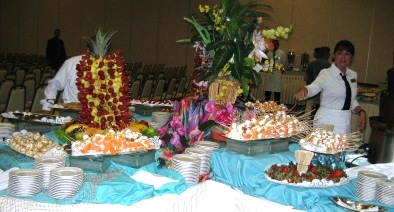
We nodded our heads in satisfaction with our plan, as perfect attendee Rebecca Wirfs-Brock produced a six dollar bill from her wallet bearing an ad for art house film with which she was quite smitten named The Aristocrats. The film is built around different renditions of what is billed as the world’s funniest, or at least filthiest, joke. Rebecca told me the joke on the way out. I laughed on-and-off for over twenty minutes. Though I said nothing at the time, I knew then and there that our intrepid little band of OOPSLA perfect attendees finally had a name.
Our retrospective itself was preceded by a sumptuous, outrageously decadent dessert spread sponsored by Sun Microsystems, to commemorate (only) the tenth anniversary of the Java programming language. It was like something out of Charlie and the Chocolate Factory. A persistent rumor had it that Sun had shelled out $20,000 for six hundred helpings. Suffice to say there was enough molten chocolate on hand to have dipped every attendee there up to his neck in the stuff.
The bridge from the reception to the retrospective was to have been provided by designated Java Oompa Loompa (note the OOs) James Gosling, but he proved unable to attend. We were, however, as a dividend of the Backward! committee’s video production efforts, to display a clip of Gosling’s OOPSLA 1996 talk, The Feel of Java that Don Roberts had carefully selected for this very occasion.
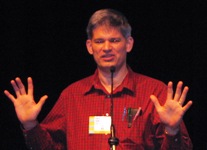
With Gosling sidelined, the duty of holding up the Java Standard fell (figuratively, this time) to his designated stunt double: Steele. Guy Steele. It is customary that a stunt double be less handsome, less erudite, and more athletic that his corresponding leading man. I regret that I must inform you that Steele (who is depicted here vividly indicating Java’s age using the fingers on both hands) fell short on all three counts.
I’d noted as well that Steele had delivered what was unquestionably the cleverest talk I’ve ever heard in my life, Growing a Language at OOPSLA ’98 in Vancouver. As part of our Backward! commemoration, we’d embarked on the process of transferring some of the OOPSLA video archives to DVD late this summer, with the hope of setting up a Wayback/Time Machine space in San Diego. We used the video of Steele’s talk to test the equipment, and it attracted quite a crowd. Though we had about fifty other vintage events to show, Steele’s talk was the only one we exhibited. Other ‘bloggers have cited it as among the most impressive things they saw this year at OOPSLA. I could have sold a hundred of ‘em.
The knowledge that one is about to speak induces a kind of mental tunnel vision, or information triage, that makes concentrating on the speaker before you more difficult. I don’t recall that Steele said anything he hasn’t said before about Java, other than there were unspecified things they’d do differently now.
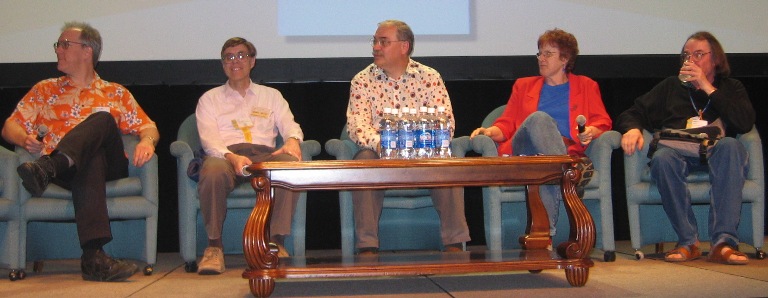
We opened the retrospective proper with our five perfect attendees, The Aristocrats (left to right), Ralph Johnson, Ed Gerringer, Allen Wirfs-Brock, Rebecca Wirfs-Brock, and your humble correspondent, fielding a few softballs. I’d noted that not only had Allen and Rebecca attended every OOPSLA, but that they had been married for nearly thirty years. Any bets as to whether OOPSLA, let alone Java, will make it that far?
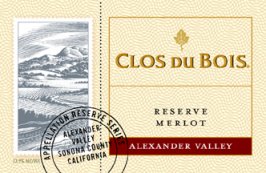
I’d introduced the proceedings brandishing a bottle of Clos du Bois (get it?) Merlot, and vowed that once we five were down to two, we’d crack open that bottle and drink it. I wish I could remember where that cliché came from. I think it was a bottle of Bordeaux, and a fighter squadron, in the original tale.
Once the retrospective began, it fell to Linda Rising, Mary Lynn Manns, and fellow lifer Allen Wirfs-Brock to save the day. Allen came armed with a veritable litany of who was here when questions that managed to get some of the older folks in the crowd a pretty good workout, what with repetitive standing and sitting. Allen and Linda subsequently widened the panel to anyone who’d been at OOPSLA ’86 in Portland. That produced a satisfactory quorum of the village elders.
Q: What kept me coming back?
A: The free booze.
A: OOPSLA, said I, was an intellectual Brigadoon, a place you could return to every year, and pick up conversations in mid-sentence. A place like a cocktail party on the Bizzaro World, where you could glibly discuss topics like multimethod dispatch, and be surrounded by the other thousand people on Earth who thought that that was fascinating.
There was a steady stream of questions from the floor. One somehow involved the idea of removing the OOs from OOPSLA, and just re-branding the conference as Programming Languages and Systems. I quipped that were we to banish the OOs from OOPSLA, Rik SmOOdy and I would have to move to Serbia. I’m not sure whether anybody got it.
There was a query as to our most embarrassing OOPSLA moment. I recalled with horror the reception that Al Gore’s science advisor was given at the after dinner speaker at the last OOPSLA banquet in Washington, DC in 1993. Rebecca grabbed the baton and recalled how noisemakers distributed during one of the panels, in combination with wine distributed during the meal, lead to this genuinely appalling breach of etiquette.
I fondly recalled, at one point, Alan Kay’s banquet presentation on the Vivarium project at the very first OOPSLA. I repined as to how he’d managed to gore every oxen in the house, and being struck that one could actually do that at a research conference. For good or ill, my life was changed.
I recalled as well, as I often do, how he’d observed, as he so often did, that Good ideas don’t always scale, which prompted Henry Lieberman, the next day, to inquire So what do we do, just scale the bad ones?
Someone lobbed a slow ball down the middle for us at one point, asking us what things would be like down the road. Having been spending my time in the High Performance Computing world of late, I’m convinced that things seven or so years from now will be quite a bit more different from now than now is from seven years ago. With Moore’s Law exhausted, and a multicore breakout in the works, and PS3s and their ilk poised to bring supercomputer power to every teenager on the planet, we’ll be faced with the challenge of coming up with a programming model. MPI meets Actors meets Darwin meets Worse-is-Better. How will we squander this bounty?
After a while, I recalled the mix of deference and fascination, mingled with a dash of pity and boredom with which I’d have greeted such a gathering of elders nineteen years ago, and wondered what the folks in our audience, few of whom had bailed out in the midst of this, were thinking. Regardless, I was really enjoying myself, at least, as can be seen in the picture below depicting fellow OOPSLA gadfly Dave Ungar wistfully waxing eloquent over I can’t remember what as I gaze on in rapt attention.
In an elegiac moment, Ungar also recalled the year that we discovered that a Sarcasm Birds-of-a-Feather session was inherently impossible to organize if you tried to get the right people to come to it.
There were moments where what we were doing felt a tad indulgent. I recalled my youthful garage band sessions, which were way more fun to perform than they were to listen to, and thought, well, if that’s what we’re doing, then what the hell, we deserve it. As the retrospective wound down, I felt oddly, uncharacteristically sanguine about it all. It’s hard to deny that we have made a difference over the last nineteen years.
What with the dessert spread and all, this affair seemed more akin to a Jewish Wedding than an Irish Wake. We got insulin shock, alright, but nothing to wash it down. But this event, in the end, was what it needed to be, and about as much fun as it could have been, at least without the liquor…
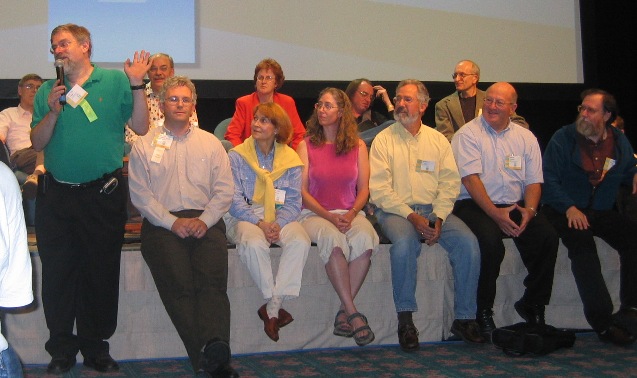
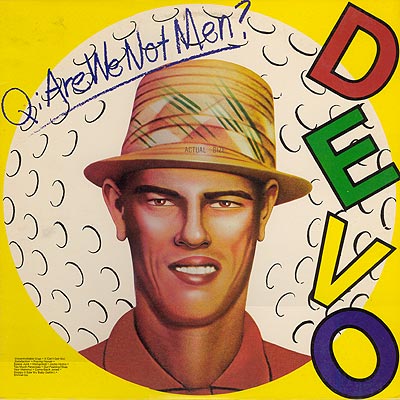
 The primacy of code, and of runtime mechanisms as a condign recognition of the intricacy and fallibility of code was a central theme of my
The primacy of code, and of runtime mechanisms as a condign recognition of the intricacy and fallibility of code was a central theme of my 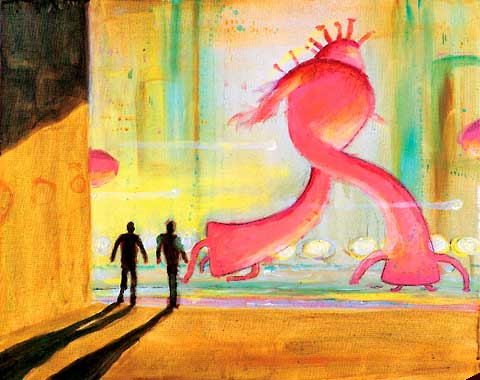

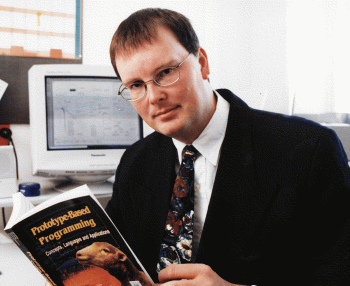



 And, In the glamorous and exotic world of object-oriented world of object-oriented software style, of code couture, if you will, the very best designers, the doyens of design, are known, as in the fashion world, by a single name: Kent, Ward, Ralph, Rebecca, and ... Martin.
And, In the glamorous and exotic world of object-oriented world of object-oriented software style, of code couture, if you will, the very best designers, the doyens of design, are known, as in the fashion world, by a single name: Kent, Ward, Ralph, Rebecca, and ... Martin.







